
Home > Best CPUs
The State of the CPU Market + FAQ On Choosing the Right Processor for Your Needs
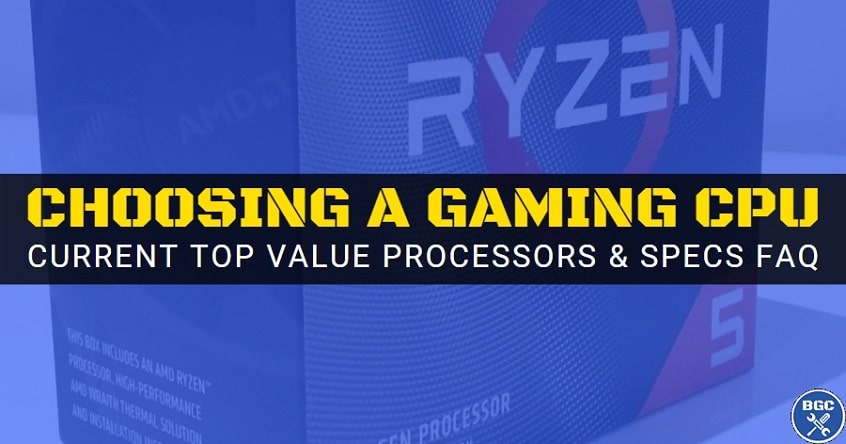 Second only to your graphics card in importance, the CPU you choose has a direct say on the performance you’ll get
Second only to your graphics card in importance, the CPU you choose has a direct say on the performance you’ll getLast Updated: January 21, 2021
Choosing the best gaming CPU (also called a processor) doesn’t have to be too difficult; if you buy the best you can afford within the latest generation of AMD or Intel processors and call it a day, it’s hard to go too wrong as you generally get what you pay for when it comes to buying a new CPU. However, only a Sith deals in absolutes, and there can occasionally be certain processors that do indeed perform the same or even better for less money than competing models. Therefore, being clued into what’s going on in the market can allow you to make a wiser purchase.
In this guide I’ll summarize the current state of things from as objective a point of view as is humanly possible, focusing primarily on what the performance data out there in benchmark land says about which CPUs have the best price vs performance in most modern games. To wrap up we’ll also cover some common beginner questions surrounding choosing a CPU. Let’s get straight to it, starting off with an overview of how CPU land sits right about now.
Related: Choosing the Right Motherboard (& Compatibility FAQ)
CPU Wars: State of AMD vs Intel in Q1 2021
A few years back, choosing the best CPU for gaming could be quite simply summed up by the following: if you wanted the highest frame rates possible, you went Intel. If you wanted to save money, you went AMD and were happy with your slightly less frames. Nowadays, that doesn’t apply anymore, and AMD have seriously stepped by their game.
Continuing on from last year, the Intel vs AMD battle of the CPU behemoths is as hotly contested as its ever been. In a slow switcheroo that’s been developing over the past few years, we’ve seen AMD edge closer and closer to Intel as gaming CPU king with each iteration of their Ryzen series.
See Also: How to Install a CPU
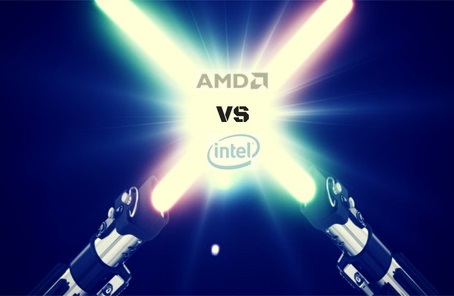 After years of Intel domination, AMD now has the high ground (for now)
After years of Intel domination, AMD now has the high ground (for now)With their latest Ryzen 5000 launch – technically 4th generation Ryzen as they leaped from the previous Ryzen 3000 to Ryzen 5000 ’cause simple hardware naming schemes be damned – the red David rise and takeover of blue Goliath is now complete. Yep; AMD currently own the crown as fastest gaming CPUs on the market, with their latest Ryzen 5 5600X, 5800X, 5900X and 5950X sitting in the clear when it comes to gaming performance vs Intel’s current 10th generation.
But the established empire doesn’t fall so easily, and you can bet Intel will strike back once more later this year with their own next lineup, that’ll probably clinch back the gaming performance crown (and the endless cycle continues). But just because AMD currently boasts the fastest chips, they are quite expensive (not to mention hard to get your hands on), and right now Intel CPUs are priced quite competitively to combat the alluring new Ryzen 5000 series.
Right now there is healthy competition in the consumer CPU market, and the truth is that you can’t really go wrong with either Intel or AMD. If you want the absolute fastest gaming performance money can buy right now, as surprising as it may sound if you’ve just got back in the PC building game after a long hiatus, AMD is the way to go and will edge out the competition at the top of the CPU stack, but at the right price Intel can still be a good buy without question.
In the mid-range CPU market, it’s a very close contest, with Intel i3 and i5 options going for quite decent prices compared to the now more popular Ryzen 5 line. So while the Ryzen 5 3600 and 5600X are super popular choices, and still what I suggest to most gamers, it all depends on current pricing in your region because lately these 2 chips have been overpriced a little at times, making their Intel competition alluring options.
Rant on the current market aside, if I had to narrow things down to the top value, best value processors for gaming right now (based on US pricing), here’s what I got for ya. If you want to see how some of these CPUs fit into a full PC build example (ie which parts go well with them, including what motherboard to choose), check out our current best gaming PC build examples as well which contains comprehensive advice on choosing any and all PC parts for a killer new system.
Also note the recommendations below are just my opinion, and as I said before it’s hard to go too wrong with any modern Intel or AMD model. You generally get what you pay for, so a more expensive CPU is typically going to perform faster than a model priced for less. Though not always; some CPUs definitely ARE overpriced compared and you can get caught out if unware of what’s going on in the market at any given time.
Plus, if one or another of the big two has any edge over the other at any price tier in terms of performance, the difference is usually going to be quite negligible, and only noticeable on paper in benchmarks (and not in practice when gaming unless you are a serious enthusiast who can notice every little minor spike or dip in frame rate like Neo feeling his way through the Matrix blindfolded.
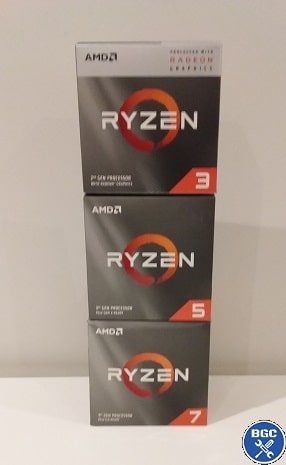 Stacking chips; these Ryzen 3000 CPUs were great, but Ryzen 5000 is even better
Stacking chips; these Ryzen 3000 CPUs were great, but Ryzen 5000 is even betterPlease note the following regarding the CPU recommendations below:
- Any prices mentioned below are in USD (US Dollars)
- For examples of how to incorporate these CPUs in a full build, see our latest gaming PC builds for examples
The Best Cheap Gaming CPUs (For Budget Builds)
Top Value Recommendation:
- AMD Ryzen 3 3100 4-Core (if < $120)
Secondary Recommendations:
- Intel Core i3 10100 4-Core (if < $110)
- AMD Ryzen 3 3200G 4-Core (if < $110, APU)
Honorable Mentions:
- AMD Ryzen 3 3300X 4-Core (if < $140)
- AMD Ryzen 5 3400G 4-Core (if < $150, APU)
- AMD Ryzen 5 1600AF 6-Core (if < $90)
- Intel Core i5 9400 6-Core (if < $150)
At this moment in time the budget CPU market isn’t in the best shape – while there’s some very good value gaming chips like the latest Ryzen 3 line (3100 and slightly faster 3300X, the latter of which actually gets quite close to the Ryzen 5 3600 in most games), they’re hard to find in stock AND and/or at their original MSRP. If you can find either at a fair price, they’re easily the best budget gaming CPUs right now for entry-level gaming systems.
Related: How to Save Money When Building a PC
A solid alternative that’s neck and neck performance-wise with the Ryzen 3 3100 is the Intel Core i3-10100, which is actually easier to find in stock and at a fair price right now. So it may be your only real option on a budget, depending on your region. Don’t forget the solid value APUs too – the 3200G and 3400G include very respectable integrated graphics performance, meaning you don’t need to buy a dedicated graphics card and you can get decent gaming performance in older and/or less demanding titles at 1080p. But for most gamers, you really want to bring a graphics card to the PC building party, otherwise your rig will really struggle in the most demanding titles on the market.
The Ryzen 5 1600 AF is a strange product; the name suggests it’s a 1st gen Ryzen chip, but it’s actually a faster 2nd-gen refresh of the original Ryzen 5 1600 (the one with “AE” in the model number instead of the much more meme-friendly “AF”). At its initial launch price of $85 USD, the 1600 AF was a stellar value buy, as getting a 6 core 12 thread processor that performs similarly in games to the very respectable Ryzen 5 2600 for that sort of price is an objective steal if ever such a thing exists in hardware.
However, since then the price of the 1600 AF has only increased with its demand, so whether or not it’s worth buying today depends on your region. If it’s under $90-100 USD, it’s worth considering over a Ryzen 3 3100 or 3300X, especially if you want the 2 extra cores the 1600 AF boasts that’ll come in handy for heavy multitasking or other non-gaming applications. But if the price creeps up beyond $100, you’re better off just getting the 3100 or 3300X, assuming they’re not astronomically overpriced which is unfortunately quite common right about now as mentioned.
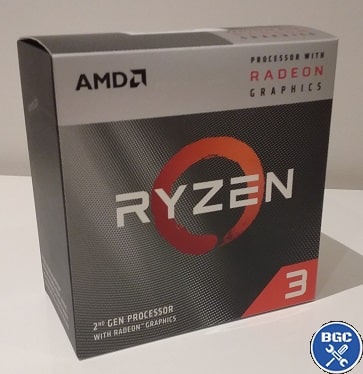 The 3200G: The best value CPU with integrated graphics
The 3200G: The best value CPU with integrated graphics
The Best Value Gaming CPUs (For Mid-Range Builds)
Top Value Recommendation:
- AMD Ryzen 5 3600 6-Core (if < $200)
Secondary Recommendations:
- Intel Core i5 10600K 6-Core (if < $260)
- AMD Ryzen 7 3700X 8-Core (if < $290)
Honorable Mentions:
- Intel Core i5 10400 6-Core (if < $180)
- Intel Core i5 10400F 6-Core (if < $160, no iGPU)
- AMD Ryzen 5 3600XT 6-Core (if < $230)
- AMD Ryzen 5 3600X 6-Core (if < $210)
- Intel Core i5 9600K 6-Core (if < $200)
It’s not just the budget CPU crowd that’s had prices occasionally creep up past MSRP, with mid-range CPUs like the ever popular Ryzen 5 3600 sometimes going for a little over $200, which is unfortunate to see considering its price was on a downward trend around a year ago.
But if you find it at its regular $200, it’s still the go-to for value, and has been for quite some time now. The 3600 delivers very good gaming performance and will handle any modern game fairly well; even the most CPU intensive titles like Cyberpunk 2077, Red Dead Redemption 2, and VR games can be tamed by a 3600 when paired with a good GPU of course.
The only real reason to spend more on a CPU for your gaming PC is if you’re either going all-out with a top of the line GPU and don’t want the possibility of holding it back from doing its thing, or if you’re wanting the highest frame rates possible for a 144Hz or 240Hz monitor (where CPU grunt matters a whole lot more than say 60Hz monitors).
Related:
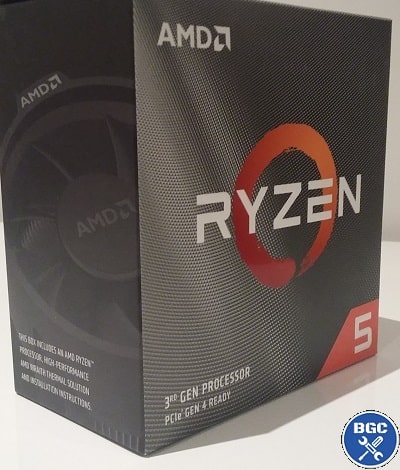 The Ryzen 5 3600 is still the best bang for buck and its 6 cores and 12 threads are all you need for modern AAA games
The Ryzen 5 3600 is still the best bang for buck and its 6 cores and 12 threads are all you need for modern AAA gamesThe Fastest Gaming CPUs (High-End Builds, VR, or 144FPS+)
Top Value Recommendation:
- AMD Ryzen 5 5600X 6-Core (if < $310)
Secondary Recommendations:
- AMD Ryzen 9 5900X 12-Core (if < $550)
- AMD Ryzen 7 5800X 8-Core (if < $450)
- Intel Core i7 10700K 8-Core (if < $360)
- Intel Core i9 10850K 10-Core (if < $440)
Honorable Mentions:
- Intel Core i7 10700KF 8-Core (if < $330, no iGPU)
- Intel Core i9 10900K 10-Core (if < $470)
- Intel Core i9 10900KF 10-Core (if < $450, no iGPU)
- Intel Core i7 9700K 8-Core (if < $260)
- Intel Core i9 9900K 10-Core (if < $320)
- AMD Ryzen 9 5950X 16-Core (if < $800)
Now to the king of the gaming CPUs as of right now, with the mighty-fast new Ryzen 5000 series chips taking the CPU cake and offering the highest frame rates in their respective tiers. I speak of the 5600X, 5800X, and 5900X, all of which generally beat their Intel competition right now in the majority of games, though as mentioned earlier Intel CPUs aren’t the worst deal right now as they are sometimes at quite attractive prices. Never thought we’d be saying the words value and Intel in the same sentence, as they’ve been notorious over history for being the more expensive option, but AMD have flipped the tables in recent times and they’re now the go-to for top performance – but at a cost.
These new AMD chips are super fast, but quite pricey. So overall, it’s a tough decision in this high-end segment, but if you just want the absolute best “value” in a high-end CPU, the 5600X is a stellar performer in most gaming benchmarks you see online, coming relatively close to even the 10900K in some titles. For more of my thoughts on some of these high-end CPUs, as well as more tips on lower CPU tiers, see our comprehensive top PC builds for gaming series where we detail builds for different budgets which contains a lot more CPU talk as well.
Related:
How to Choose a CPU (Beginner FAQ)
If you’re new to hardware and choosing a CPU for your first gaming PC, let’s cover some common newbie questions if you’re wondering about certain details and want to learn more.
What is a CPU? How Much Does it Matter for Gaming?
Let’s start at ground zero if you’re completely new to the world of PC hardware. The CPU (Central Processing Unit), also called the processor, is one of the most important components in any computer, and what you could consider the brains of your system. It’s responsible for making all the quick mathematical calculations that your games and other programs rely on, and the power of your gaming computer’s CPU will have a direct correlation with overall gaming performance. It’s the second most important component in a gaming PC, only trailing the graphics card in its influence on your frame-rate.
So with that said, when upgrading or building a computer for gaming you want to get the best CPU that you can afford, assuming that you’ve saved aside a similar or larger chunk of your overall PC budget to a good (or great) graphics card. However, while you do want the best CPU possible for gaming, there is a point of diminishing returns where you may be better off skipping on a high-end CPU (for a mid-range CPU) and allocating that extra money you would have spent elsewhere in your parts-list. Building a PC is a balancing act.
Do You Need a High-End CPU for 144Hz Gaming?
144Hz monitors have become increasingly popular in recent years to the point where they are now considered the standard for any competitive gamer playing fast-paced eSports or FPS shooters like CSGO, Overwatch, Warzone, and even League of Legends and DOTA 2. For these highly competitive, every-millisecond-counts games, seeing the fastest image on screen is important to allow for the most Jedi-like reflexes and reaction times. But to take full advantage of a 144Hz monitor, your PC needs to perform at 144FPS or thereabouts, and ideally even higher so that your frame rate doesn’t drop below that 144FPS mark. To get 144FPS requires a stronger CPU compared to getting say 60FPS on a standard monitor, so you need to pay more close attention to your CPU selection if using a 144Hz screen.
That said, you don’t necessarily need a high-end CPU to achieve 144FPS, because when you run competitive graphics settings (ie lower settings, a common thing to do in order to get the highest frame rate possible which is more important than graphics quality during competitive gaming) it’s not as hard for your PC to reach such high frame rates. But how good your CPU needs to be all depends on the specific game, as requirements can vary wildly. Getting 144FPS in CSGO is quite easy, and even a cheap gaming CPU will do the trick, whereas getting that type of performance in a more CPU intensive modern competitive shooter like Warzone will require a much better CPU. It’s all about doing your research and analyzing benchmarks online for your specific CPU and the game in question.
Are i3 or Ryzen 3 CPUs Good Enough for Gaming?
Intel’s Core i3 and AMD’s Ryzen 3 range of CPUs are their entry-level offerings aimed at gamers on a budget, though they can still pack a surprisingly decent punch despite being the entry-level chip of any Intel series, and depending on the situation may actually be plenty of processing grunt for the games you play. For the most demanding, CPU intensive games on the market though (think Red Dead Redemption 2 or Cyberpunk 2077), or if wanting to get super high frame rates of 100FPS and beyond, you really do want an i5 or Ryzen 5 instead if at all possible. But on a budget, a R3 or i3 can be well worth it, so I wouldn’t discount them just because they’re on the lower end of the CPU stack and comparably cheaper than other CPU families.
What Are CPU Cores and Are They Important for Gaming?
CPUs have varying amounts of cores, which are basically like microprocessors within a processor allowing for a CPU to run more efficiently and multi-task better. A CPU with 2 cores is called a dual-core processor, 4 cores is quad-core, 6 cores is hexa-core, and 8 cores is octa-core. But we’ll stop there, because for gaming, cores aren’t that important, so long as you have a certain amount. Modern games don’t utilize that many, and a good quad-core or 6-core CPU goes a long way when paired with a good graphics card.
You’d only need higher than 6 cores if you’re buying one of the absolute best gaming graphics cards and you want to avoid bottlenecking it (ie prevent it from performing at its absolute best). Put another way, anything more than 6 cores (ie 8 cores) is just a nice-to-have luxury when it comes to building a gaming PC. For more CPU-heavy non-gaming applications, that’s when having really high core counts like 10, 12, or even 16 cores can be more beneficial and/or important (but it depends on your specific workflow).
What Are CPU Threads?
Whilst a core is the physical hardware that does the processing, a thread is a single line of commands that a core works on, with each program/application having at least the 1 thread. Normal CPUs can have one core only work on the one thread at a time, whereas hyperthreaded CPUs can work on up to two threads per core which generally means faster multitasking performance.
Locked vs Unlocked CPUs
A locked CPU means that the clock speed is set and can’t be changed by overclocking, whereas an unlocked CPU is, you guessed it, an overclockable CPU. Unlocked Intel processors have a “K” in their model number, such as the Intel Core i5 8600K. AMD don’t have this naming system, but most of their CPUs are unlocked. If you want to overclock your processor, or plan on potentially doing later on, then you’ll need an unlocked model. However, if you’re not overclocking, which is what we’d recommend to first-time PC builders and hardware beginners in general, you can get either a locked or unlocked model as locked CPUs can still be a good buy even if you never plan to overclock.
What is the CPU Socket Type?
This is the type of CPU, and will need to be matched against the socket type of the motherboard you choose for your build. In other words, if you decide to go with an AMD Ryzen CPU, they have a socket type of AM4. Therefore, you’ll need to get an AM4 motherboard. For the latest Intel i3s, i5s, and i7s, they all have a socket of “1151”, so you’ll need to get a motherboard that mentions socket “1151” in the model number/specs sheet somewhere.
What is CPU Clock Speed?
The stock speed that the processor runs at, measured in GHz. Not the only factor, but a good baseline of how fast a CPU is. However, when choosing the best CPU for gaming, you should not confuse yourself with having to compare clock speeds of different processors, as you’re better off (to stay sane and for practicality) just comparing CPU benchmarks in various gaming situations if you want to compare different CPUs.
What is CPU Cache?
CPUs have varying amounts of what is called cache memory, which is memory that stores information your CPU will likely need next that it can quickly and conveniently access for better performance. If that doesn’t make sense, no worries at all, as it simply does not matter when choosing the best CPU as you should just be comparing models (and not minutia) as mentioned before.
Is the Stock CPU Cooler Good Enough for Gaming?
The best CPUs produce quite a bit of heat when put under load and require high-performance cooling in the form of a heatsink and fan. Most processors come with their own stock CPU cooler (which consists of a heatsink and fan) so in that case you’re not required to buy your own CPU cooler, which is technically known as an aftermarket CPU cooler (as in, it’s not an Intel or AMD cooler).
Though keep in mind some CPUs do NOT come with a cooler, such as Intel’s unlocked processors like the 10600K, 10700K, 9700K, etc (any CPU with a “K” on the end) as these processors are generally intended to be overclocked at least a little and require an aftermarket cooler.
Related: How to Install a Stock CPU Cooler
Speaking of overclocking, if you’re gonna be delving into that (for those who don’t know it’s basically when you manually increase the speed of your CPU past its stock speed to squeeze out more performance) then you’ll need an aftermarket CPU cooler as your chip is going to produce a lot more heat when pushed beyond its normal stock-standard speeds.
Even if you don’t plan on overclocking your CPU, which isn’t recommended for newbies to be honest, getting an aftermarket cooler (ie replacing the stock fan) may still be a good idea (depends on your specific build) to maximize cooling, increase the lifespan of your CPU, reduce noise as much as possible, oh and for looks as well – stock coolers can be plain/ugly and when you buy your own you can get one that fits your build’s look and feel.
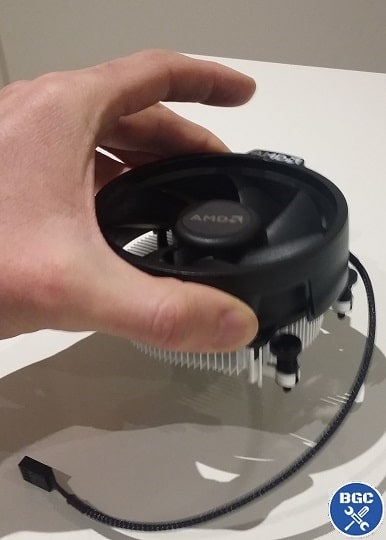 The included Ryzen 5 3600 cooler is quite decent if not o’cing
The included Ryzen 5 3600 cooler is quite decent if not o’cingGetting your own cooler is also a little more important in general with Intel CPUs, as their stock coolers are typically not as good as AMDs (this is fact, not opinion, though that’s not to say that AMD stock coolers are significantly better; only slightly). However, if your CPU comes with a stock fan then you don’t NEED to buy your own, and you could get away with using it to save money on your build (again, especially if it’s one of the latest Ryzen stock coolers which are generally great), and you could just test out the stock cooler to see if your CPU runs cool and quiet enough for your liking, and then decide later on to get an aftermarket cooler (although it’s annoying having to uninstall the stock cooler and install a new one).
Related: How to Install a Cooler Master Hyper 212
To summarize this sometimes confusing conundrum of a choice (if I had a galactic credit for every time someone asked me this I’d name my wallet Jabba) – if you’re overclocking, you really should buy your own CPU cooler, unless your CPU doesn’t come with a cooler in the first place in which case you have no choice but to buy a cooler. Otherwise, if not overclocking now or in future, you can choose either to stick with the stock cooler (if your CPU comes with one) or still buy your own better cooler anyway for improved cooling performance, lower noise, and better longevity for your system overall.






